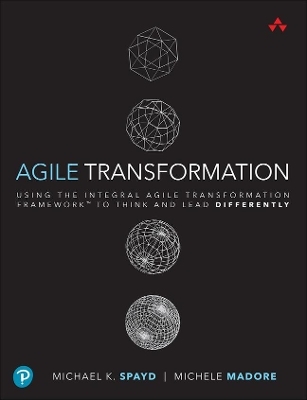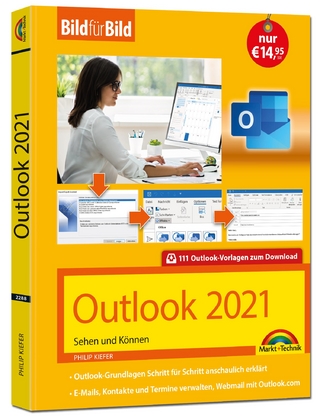
Agile Transformation
Addison-Wesley Educational Publishers Inc (Verlag)
978-0-321-88531-9 (ISBN)
Most organizational leaders know agility is paramount to survival in a world of unprecedented volatility, uncertainty, complexity, and ambiguity (VUCA). This is why so many keep attempting Agile transformations even after previous initiatives have failed. But the truth is, both organizations and leaders need new ways of thinking--they need to upgrade their organizational “operating system.”
Built on the proven Integral Agile Transformation Framework™ (IATF), Agile Transformation offers a fresh perspective and systemic approach that can operate on all levels, from individual to enterprise. Learn how to use IATF to combine what you know subjectively (“heart”) with what you can measure objectively (“data”). Even if you are already using leadership or culture models, scaled frameworks, or other techniques, IATF helps you place them in context, overcome their limitations, and gain more value from them. As it has in many other organizations, IATF can help you become an authentic Transformational Leader and finally build an organization that is truly Agile.
Gain crucial new perspective for leading your Agile transformation: insight into your world, organization, work, and yourself
Understand what your current Agile methods do and don't do, how they interact or conflict, and where you need something more
Structure existing models and frameworks into an understandable meta-framework
Master a unified and practical system for mapping what's going on and what needs to change
Discover practical ways to successfully lead both human and organizational aspects of change
Register your book for convenient access to downloads, updates, and/or corrections as they become available. See inside book for details.
Michael K. Spayd's career in Agile began in 2001 as one of the leaders of a very large-scale adoption of Agile XP. Subsequently, Michael led and coached Agile transformations in a wide variety of contexts; as part of his practice, speaking, and teaching, he has endeavored to bring in key disciplines from fields external to Agile, such as professional coaching, systemic management, organization development (OD), organization culture and change, and approaches to develop more effective sensemaking in leaders. In 2010, Michael cofounded the Agile Coaching Institute, where he trained several thousand Agile coaches. In 2016, he cofounded Trans4mation, and in 2020 he and colleagues launched the Collective Edge ( www.the-collective-edge.com), to help expand consciousness at the critical edge of our collective needs. Michele Madore is the principal and cofounder of Trans4mation ( www.trans4mation.coach). She is passionately devoted to the development of Agile coaches, leaders, and organizations across the globe. Her entire work life of nearly 30 years--whether as an organizational leader, consultant, coach, or employee--has been guided by an inner desire for positive change, with a focus on humanity in the workplace. She has spent the last 15 years helping organizations of all sizes on their journey to agility, and coached and trained hundreds of Agile Coaches. Michele is a Professional Integral Coach, a coaching method that has helped her to bring the Integral Agile Transformation Framework more alive in its practical use for organizations and in the development of leaders. Mostly, she feels incredibly blessed to share her voice, to be of service to those seeking to find their way in their work, through the gift they give in the making of it, but most especially in the feeling of it.
Preface xiii
Acknowledgments xv
About the Authors xvii
Introduction: Why an Integral Perspective? 1
The Integral Operating System 2
How This Book Is Organized 4
Questions Addressed by This Book 6
Our Perspective (and Biases) 7
Part I: Agile Transformation: An Integral Approach 9
Chapter 1: The Holon: Fundamental Building Block of the Integral Framework 11
Organizational Complexity 11
Holons 13
Holons and Agile Transformations 20
Summary 23
From Insight to Action 23
Chapter Notes 24
Chapter 2: The Quadrants: The Four Fundamental Perspectives 25
Deconstructing the Four Perspectives 25
Quadrants in Agile Transformations 36
Summary 37
From Insight to Action 37
Chapter Notes 38
Chapter 3: Integral Altitudes: The Evolution of Complexity 39
Why Altitude Matters 40
The Integral Concept of Altitude 41
How Altitudes Show Up in Organizations 41
Corroborating Research on Altitude 52
Evolution Across Quadrants 56
Summary 62
From Insight to Action 63
Chapter Notes 63
Chapter 4: Lines of Development 65
Developmental Lines 65
From Insight to Action 68
Summary of Part I 68
Part II: Transformational Leadership: Upgrading the Leader's Operating System 71
Chapter 5: Transformational Leadership 75
The Context for Transformational Leadership 76
The Business Case for Transformational Leadership 82
The Essence of Transformational Leadership 84
Summary 89
From Insight to Action 89
Chapter 6: The Developmental Landscape 91
The Core of Development: “Our Story” 91
Deconstructing the Levels 95
Collective Leadership Development 102
Summary 103
From Insight to Action 103
Chapter 7: The Developmental Path 105
How Development Actually Happens 106
The Shift from Reactive to Creative 117
The Shift from Creative to Integral 119
Using the Integral Disciplines to Foster Development 120
Increasing Collective Effectiveness 122
Summary 123
From Insight to Action 123
Part III: Organizational Transformation: Putting the Integral Compass to Work 125
Chapter 8: The Integral Agile Transformation Framework: An Overview 127
How Do We Use the Map? 128
The IATF Quadrants 129
Integrating the Quadrant Perspectives 138
How Quadrants Look from Different Holons 142
Summary 149
From Insight to Action 149
Chapter 9: The Integral Disciplines: Focusing the Transformation 151
Integral Disciplines and Developmental Lines 151
IATF Integral Disciplines 153
Integral Disciplines Mapped to Developmental Lines 154
Summary 177
From Insight to Action 177
Chapter Notes 178
Chapter 10: Leading an Agile Transformation 179
How to Get Started 179
Transformational Leader Role and Competencies 180
Activating the Integral Disciplines 204
Summary 209
In Conclusion 209
References and Relevant Readings 211
Index 215
| Erscheint lt. Verlag | 21.1.2021 |
|---|---|
| Verlagsort | New Jersey |
| Sprache | englisch |
| Maße | 175 x 229 mm |
| Gewicht | 400 g |
| Themenwelt | Informatik ► Office Programme ► Outlook |
| Informatik ► Software Entwicklung ► Agile Software Entwicklung | |
| ISBN-10 | 0-321-88531-7 / 0321885317 |
| ISBN-13 | 978-0-321-88531-9 / 9780321885319 |
| Zustand | Neuware |
| Informationen gemäß Produktsicherheitsverordnung (GPSR) | |
| Haben Sie eine Frage zum Produkt? |
aus dem Bereich


